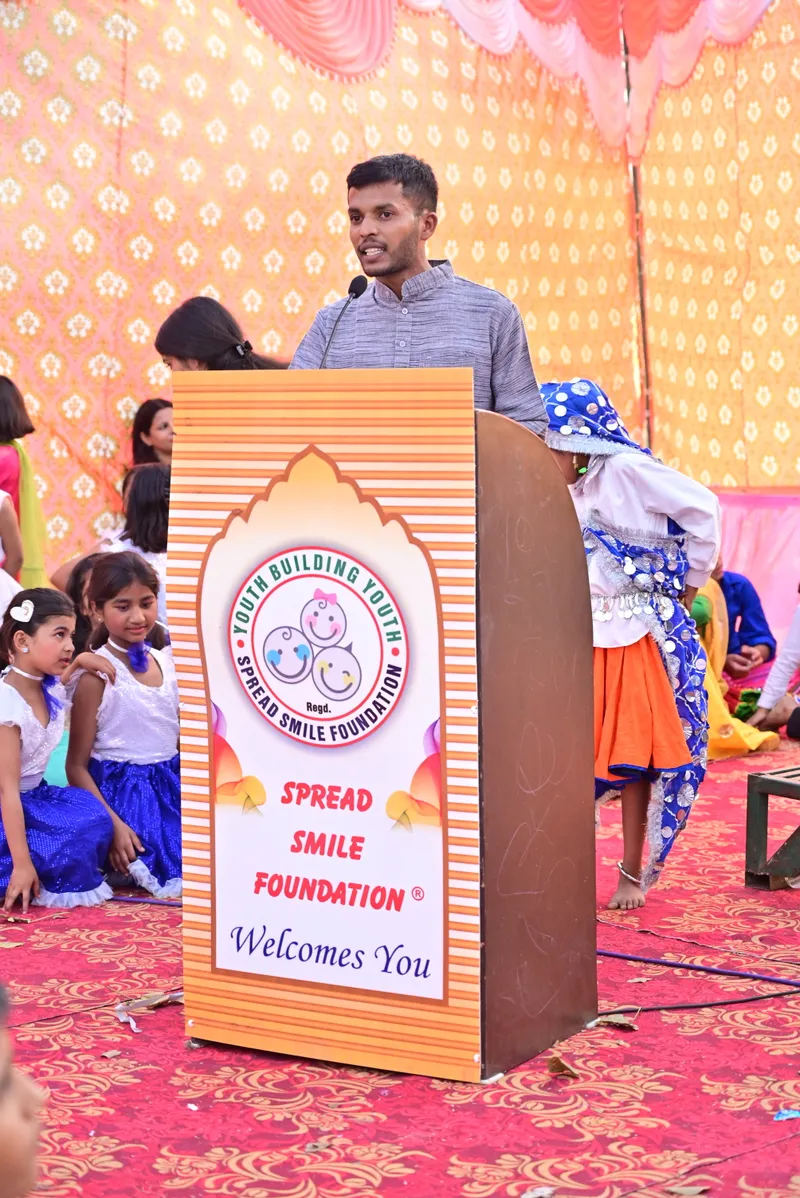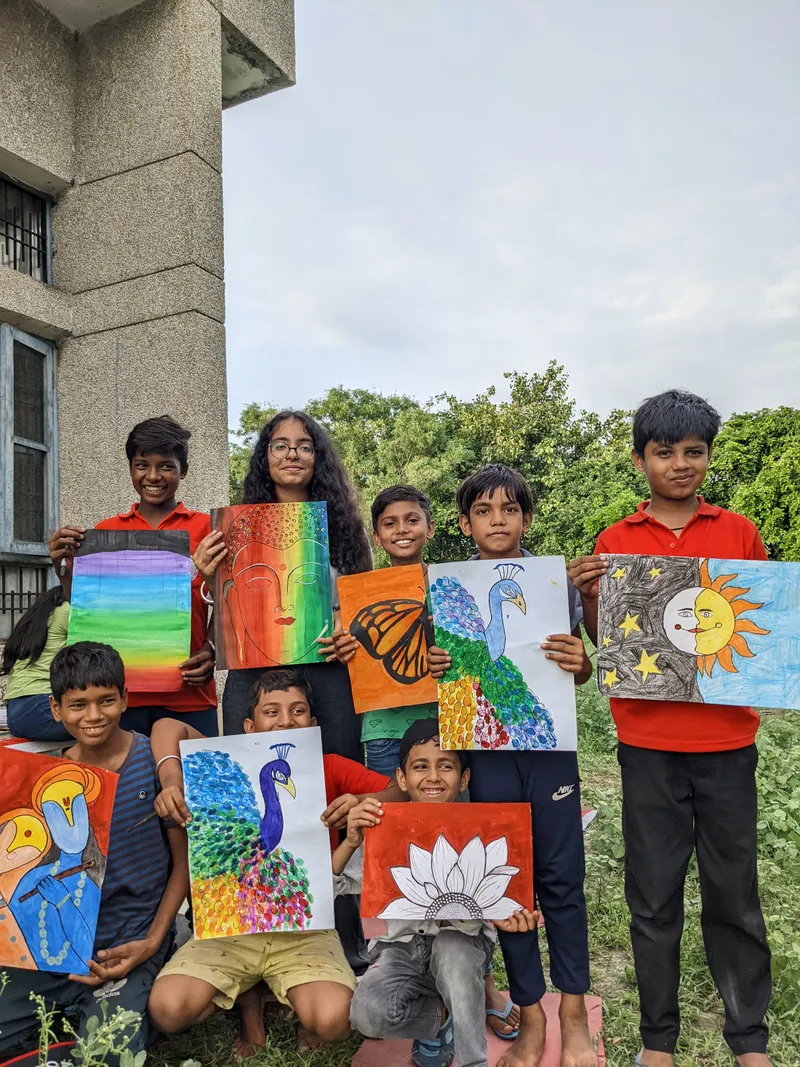How this youth-led NGO is ‘spreading smiles’ among underprivileged children in Sonipat
Nitin Jain started Spread Smile Foundation in 2019 by running evening pathshalas for children in slums in his home city of Sonipat. Today, the organisation runs several initiatives to help the underprivileged.
While studying at Delhi University, Nitin Jain actively participated in social activities like plantation drives and food distribution to the needy. His brother often remarked that he should start a non-governmental organisation (NGO) of his own.

Nitin Jain
But it was not until 2019 that Jain took the plunge—involving other youth to start the Spread Smile Foundation (SSF) in his home city of Sonipat in Haryana (NCR). The NGO that began by teaching children in urban slum settlements has now expanded to more than five initiatives to help the underprivileged.
In the beginning, to rally his friends and family to the cause, Jain added them to a WhatsApp group where they discussed ideas on what the initial focus should be.
“I would often see children begging at traffic lights and knew they came from different slum areas in the city. They did not go to school and several of them were engaged as child labour. We spoke to a few of them and decided to visit the slums to understand how we could help,” Jain tells SocialStory.
Empowering children with education
Jain and his cousin went from hut to hut in the slums to explain to parents how educating their children was important, and they would do it for free. Around 20 children turned up and thus began Vidyafal, Spread Smile Foundation’s flagship initiative.
“People were sceptical and doubtful of our intentions in the beginning. They asked how much we were getting paid to do this. Also, parents wanted the daughters to stay at home and help with household activities and the younger children to go out for work. But our families supported us and encouraged us to be persistent,” adds Jain.
When parents realised that the youth were in for the long haul, and were genuinely concerned, they started sending the children to study.
For a month, Spread Smile Foundation organised classes outside the huts, and then moved to a nearby park, but were shooed away. But the team kept on moving from park to park and it took a few months for them to get permission to hold the classes in a nearby community centre.
“We taught English and Hindi alphabets, counting, oral activities, and the basic education necessary for them to enrol in schools in the new academic year. We were able to send 60 students to private schools in the first year, paid their fees, and took care of other expenses like books and uniforms,” he says. All these were done with the help of funds raised from individual donors.
Soon, the Foundation started attracting volunteers and interns, mostly students from colleges.
During the pandemic, several huts in settlements were demolished because of the widespread nature of the disease.
“It was a difficult situation for us as we were not strong enough to help the residents. We decided to help them with food and basic shelter. A lot of students moved back to their native villages and our work was disrupted,” Jain recalls.
But it plodded on, not letting the pandemic put a stop to their activities. During the second wave, it ran a vaccination centre in collaboration with a government hospital and vaccinated 58,000 people for a year with the help of volunteers. It also distributed food kits, hygiene kits, and oximeters to thousands of people.
Expansion after the pandemic

Children learning art
When the pandemic began abating, the team once again visited the slums. They resumed the classes and started teaching children in the community centre. The evening classes attracted over 200 students and the Foundation opened pathshalas in other parts of Sonipat. Currently, there are four pathshalas where more than 400 students attend these classes.
“For classes 8 to 12, we stick to the school curriculum—Mathematics, Science, and English. For other classes, we help them with the basics, explaining concepts and clearing their doubts,” adds Jain.
The Foundation also encourages the children to enrol in music, dance, and art and craft classes. Recently, it also started special courses in sewing so that young girls can earn a livelihood. It also runs a charitable dispensary where a doctor volunteers for two hours every evening and medicines are given free of cost. Its nutrition drive Poshan ensures students are provided with food kits and provides nutrition kits to 200 tuberculosis patients every month. Spread Smile also organises tree plantation drives, health camps, and donation of hair for cancer patients. So far, it has impacted around 1,50,000 people through its projects, among which 15,000 are children. It has 1,200 volunteers, mostly youth.
A group of volunteers also work in slums in Noida and Delhi.
Moksh Grover, a member of SSF says, “I have been associated with the organisation for four years and have learned a lot from experiences, especially how educating children can bring about a change in society.”
Lakshya, a young student at the patshala shares that his dream is to be an engineer.
“To the children who hesitate to study, I would like to say, ‘come to SSF and see how educational concepts are being made easy for you’. Earlier, I used to hate studying, but now I attend classes regularly and study hard,” he says.
Most of its funds continue to be raised from donors.
“One of our students is the first from her family among three generations to go to college. Two of our students scored 95% and 92% in class 10 this year. Our yearly celebration saw a thousand people attending. These are some of the successes we are proud of,” Jain says.
Jain who has BCom, MCom, and MBA degrees, recently completed his Young Indian Fellowship from Ashoka University where he was also awarded the Cheishta Kocchar Memorial Honour for embodying the ideals of care, compassion, and community service. SSF is currently being incubated in the Summer Incubation Program at the InfoEdge Centre for Entrepreneurship, Ashoka University.
“I aim to continue our work in Sonipat and ensure that every child has access to education. We also want to collaborate with various universities to provide a platform for youth to engage with social causes,” he says.
(The story has been updated to include details of incubation.)
Edited by Megha Reddy






